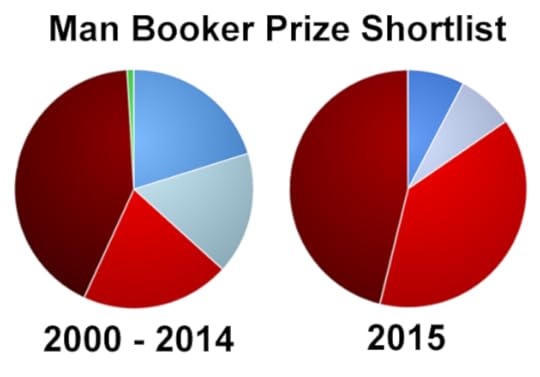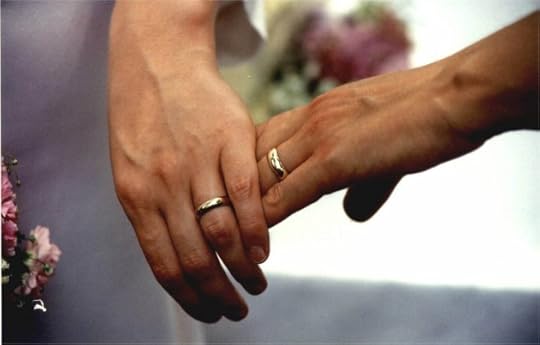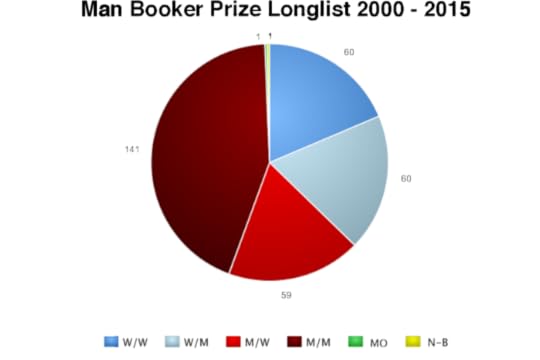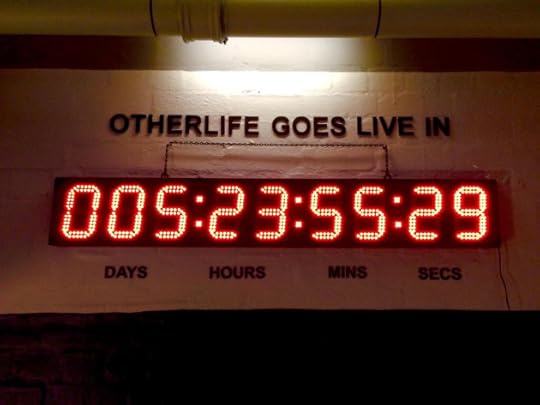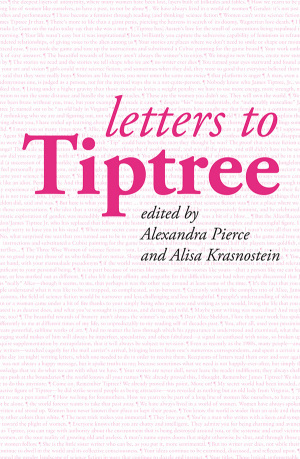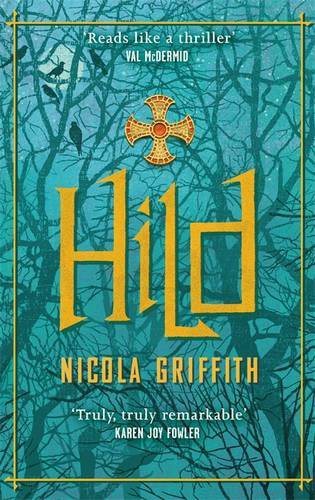Nicola Griffith's Blog, page 70
September 16, 2015
The Man Booker 2015 Shortlist is appalling
From the perspective of gender bias, specifically women’s voices, this year’s Man Booker Shortlist is far worse than usual. In terms of racial diversity, it’s pretty good: 4 authors of colour out of a total of 6, which is a big improvement on previous years. But women protagonists get short shrift.
I have shown in a previous post that bias against women’s voices accelerates between literary prize shortlists and winners. The clear bias against female protagonists, which is about the same between long- and shortlists, gets suddenly worse when the One Book to Rule Them All is chosen from among those shortlisted. The shortlists are bad enough: from 2000-2014 only about 36% of the protagonists of the shortlisted books for the Man Booker are women—and half of those are written by men.
This year, though, there are far fewer women’s voices on the shortlist than usual.1 In fact, it’s so bad that there are fewer protagonists in this year’s shortlisted novels (15.4%) than there are usually among the winners (16.6%).
This year, 2 of the 6 shortlisted books are written by women. Between them they wrote 6 protagonists, 5 of which are men.2 One male author writes about 1 woman (though he also writes about 3 men). So this year, of the 15.4% of protagonists who are female, a pitiful 7.7% are women written by women.
In terms of author diversity I’m very glad to see so many writers of colour on this list. I applaud diversity—I want literary prize lists to be diverse in every way. But almost all the books shortlisted for the 2015 Man Booker Prize, the books deemed important, interesting, and worthy of attention, are about men. Why so stories about women continue to be considered unworthy of prize consideration? Women’s voices are half the world. We must be heard.
1 The green represents Other, that is, non-human and so unclassifiable by gender. I frankly forgot to include it in the key.
2 Much of this counting and classification is a judgement call. We welcome discussion and correction.








September 10, 2015
My story, mystery: my love letter to Hild of Whitby
Just up at Los Angeles Review of Books, “My Story, Mystery,” another of my Letters to Dead People.* This one is addressed to Hild.
You were magnificent, I think, but hidden: a black hole at the heart of history. We can trace you only by your gravitational pull.
[…]
By writing your story I am looking at where we come from — the past — and believing we could have survived there as ourselves. By imagining you as possible, I am recasting what today we think might have been possible. By reclaiming the past, retelling it to include women as people, I’m remaking the present, and, I hope, changing the future.
Enjoy.
* The first in the series is “The Women You Didn’t See,” a letter to Alice Sheldon a/k/a James Tiptree, Jr. Also available in the wonderful anthology, Letters to Tiptree.








September 8, 2015
Update on Literary Prize Data Group
The Literary Prize Data group, formed just under a month ago, is up and running. Running fast! We have over 50 members on 3 continents with a wide range of skills and experience. We’re all unpaid. But we’re doing this because it’s necessary: not only do women win fewer prestigious literary prizes than men, we are even less likely to win if we write about women. The net result is that women’s perspectives are being left out of the vast, cultural engine that is literature. Literature—the stories we tell—forms the backbone of who we believe ourselves to be, and how our society could be. This matters.
Every week I send an update to the group of the big picture as I see it. It occurred to me that others might be interested, too.
The purpose of the Literary Prize Data group is to assemble data on English-language literary prizes to get a picture of how gender bias operates within that ecosystem.
I suspect this remit will change and grow with time—some possibilities include extending to other parts of the publishing sphere, and to varieties of intersectional bias—but for now, while we build our systems, we’re firmly focused on literary prizes and on gender.
This involves:
Counting longlists, shortlists, and winners of literary prizes in terms of the gender of both authors and their protagonists (that is, POV character)
Inputting that data into a powerful, well-designed database
Using that database to output charts and summaries
Publicising those charts and summaries
To that end, so far we have:
Assembled good, solid data on 2 awards, Man Booker and Edgar (novel), and have members working on many others, including:
Saltire
Asian Man Booker
Hugo
Nebula
Carnegie
Campbell Memorial
Bailey’s/Women’s Prize
Australian and New Zealand awards
Put together a spreadsheet template in two formats (one vertical and web-based, for mobile use; one horizontal, for home use) for members to use when gathering the data
Built a nifty visualisation library based on Exhibit
Started planning a powerful database which will be public and checkable, and hosted by MIT
Begun discussion of quantifiable guidelines for categorising protagonists
Many of us now have our hands full, counting or building, but I can see more on our immediate horizon. Tasks ahead of us:
Turn our attention to sharing the data as we get it, to which end:
identify members willing to create charts and other graphics
choose a URL and where to host
Half a hundred other things—systems to seek and implement corrections; social media wrangling; outreach to other organisations, etc—and ways to decide, prioritise, and execute all those things
Much of this involves vast amounts of hidden work. There’s always more to be done, of course. If you feel able to help with anything I’ve listed, please consider joining the group, or email me privately. We’re figuring out ways to chunk the tasks so that small groups can work together on one prize: no one works alone! As I’ve said, our remit will probably change and grow over time. For now, though, our we remain focused on gender and literary prizes.
For a group of people who have never met in person, come from widely varied backgrounds, and bring a huge mix of skills and perspectives, I think the group is doing incredible work. I am delighted, amazed, and grateful.
Thank you.








September 4, 2015
2 years ago, and 22 years ago
Today is our wedding anniversary, the 22nd of this one:
The second of this one:
It’s the first one we have ever have spent apart. But it’s for a good cause: Kelley’s movie, OtherLife, now shooting in Perth, Australia. And, ah, we will party when she gets back!








August 31, 2015
Book bias gets magnified between shortlists and winners—some data
Data suggest that the step from literary prize shortlist to winner might be an important inflection point in the operation of unconscious bias against women in the publishing ecosystem.
My recent focus on literary prize diversity has been aimed squarely at gender, both that of a book’s author and its main characters (those characters through whose perspective the narrative is funnelled; point-of-view characters).1 Due to the valiant efforts of the Literary Prize Data group, we now have data for the Man Booker Prize and the Edgar Allen Poe Award for Best Novel going back to 2000.
For the Man Booker we looked at longlist, shortlist, and winners. The Edgar does not publish longlists, so we could quantify only the shortlist and winners.2
Here’s the Edgar shortlist3 (usually 6 novels):
Women who write novels that are shortlisted for the Edgar write more about women than about men. Some men write about women, too (though they write about themselves nearly 10 times as often). Of the shortlisted novels, women make up 35 of the 111 point-of-view characters, or about 31.5%
Now look at what happens when the 90 shortlisted novels are whittled to 15 winners.
The overall proportion of women writers falls and those remaining write as often about men as about women. No men write about women. Of the 19 point-of-view characters, only 2 are women. In other words, the leap in prestige from Edgar shortlist to Edgar winner is mirrored by a drop in the number of female perspectives–women’s voices–from about 31.5% to 10.5%.
Here’s what the Man Booker longlist looks like4:
Note that the number of women writing about women, and men writing about women, are exactly equal, both 60 of the 322 total protagonists. Women’s points of view add up to 37% of the total.
Then the longlist is shortened from 13 books to 65
The change is relatively small. The proportion of women writing about women and those who are writing about men stay equal at 22 out of 109, or about 20%. The proportion of men writing about women falls in comparison, to 18 of 109, or about 18.5%. In other words, the total percentage of female perspectives actually goes up a little, to 38.5.
But, oh, look what happens when the jury has to come up with the One Book to Rule Them All:
The enormous leap in prestige, from being able to label your book Man Booker Shortlisted to Winner of the Man Booker Prize, is mirrored by a corresponding plummet in the proportion of in women’s perspectives from 38.5% to a paltry 6.66%.
Edgar shortlist to winner: women’s voices drop from 31.5% to 10.5%
Man Booker shortlist to winner: women’s voices drop from 38.5% to just 6.66%
So when we’re talking about prestigious book awards, whether for crime fiction or literary fiction, it appears that the step from shortlist to winner is where women’s voices fall most alarmingly. This is where women’s voices are throttled.
Looking at how and why might prove fruitful.
1 This can be subjective, which is why we’re building a searchable database. When it’s up, we will welcome input and corrections.
2 We’ve changed the way we count: instead of “About women,” “about men” and “about both” we’re now totting up the total number of POV characters. So if the book under discussion is a linked collection of stories written by a woman with, say, 4 stories written from the POV of women and 7 from those of men, we count 11 protagonists in all, and assign 4 to “Women by women” and 7 to “Men by women.” (These will probably be relabelled “Female by female” and “Male by male” for the simple reason that the notation F/M is less error-prone than, say, W/M. Also, “Female” and “Male” cover both adults and children.) In addition, you’ll see that the two sets of charts are marginally different. I’ll standardise it at some point soon.
3 The Edgar calls their shortlisted novels Nominees.
4 The yellow and green segments are, respectively, Non-binary and Other. The latter includes animals, aliens, and other non-human protagonists. Note that for the longlist we have 16 years-worth of data versus 15 for shortlist and winners.
5 The longlist is currently 13 books, the shortlist 6. This has not always been the case.








August 25, 2015
Kelley’s film OtherLife now shooting in Perth
Ten years ago, Kelley started working on the screenplay for OtherLife, a film based on her New York Times Notable Novel, Solitaire. Today we’re are delighted (amazed, thrilled, beaming so hard I think I might take off into orbit) to announce that it started shooting in Perth. It’s a woman-driven SF thriller.
OtherLife is directed by Ben C. Lucas (Wasted on the Young), a fiercely talented director and writer who brings depth and heart and passion to the film. The script is written by me, Gregory Widen (Highlander, Backdraft, The Prophecy), Lucas Howe, and director Ben Lucas. The film stars the fantastic Jessica De Gouw (Dracula, Arrow, and the forthcoming Underground), as well as Thomas Cocquerel (Kidnapping Mr. Heineken) and TJ Power (Eat Pray Love, The Sapphires, Wasted on the Young).
Go read the rest on Kelley’s blog; she’ll tell you all about it.








August 24, 2015
Happy Birthday, Dr Alice James Raccoona Tiptree Bradley Sheldon, Jr
To celebrate today’s 100th anniversary of the birth of Alice Sheldon (born Alice Bradley, a/k/a James Tiptree, Jr, a/k/a Raccoona Sheldon), Twelfth Planet publish Letters to Tiptree, edited by Alisa Krasnostein and Alexandra Pierce. It contains letters from 35 writers, editors, critics and fans (including me) who have been influenced by her work. And there’s bonus reprint material:
archived letters from Ursula K. Le Guin, Joanna Russ and James Tiptree Jr./Alice Sheldon
excerpts from The Secret Feminist Cabal: A Cultural History of Science Fiction Feminisms by Helen Merrick
excerpt from Battle of the Sexes in Science Fiction by Justine Larbalestier
essay by Michael Swanwick
You can buy print, ebook, or a print/ebook bundle—from $6.99—wherever you are. This is a great collection, worth snapping up sight unseen, but if you want a taste before you buy, try my contribution, “The Women You Didn’t See,” or Brit Mandelo‘s essay, for free.
I know what I’ll be reading this afternoon…








August 23, 2015
Carol: teaser trailer
The Hugo Awards went as well as could be expected. Rather than ruminating on the results, let’s just look at luscious things. Here’s the teaser trailer for Carol, based on Patricia Highsmith’s Carol/The Price of Salt, starring Cate Blanchett and Rooney Mara. In theatres 27 November. Happy Sunday.








August 20, 2015
UK paperback of Hild available for pre-order
Out in six weeks, October 1: a luscious, newly-typeset paperback edition of Hild. At 640 pages, it’s more capacious than before. I’ve put together a good list of UK independent bookshops so you can pre-order. Or you could pre-order from a handy chain store:
Waterstones | Amazon | Foyles | Blackwell’s
Also available in ebook, and various retailers in Australia and New Zealand…
Booktopia | Bookworld | Paper Plus | Mighty Ape
…and as an ebook at your favourite online retailer.
Praise
“In it’s ambition and intelligence, Hild might best be compared to Hilary Mantel’s novels about Thomas Cromwell.” — Jenny Davidson, Bookforum
“Vivid, richly detailed…a powerful, clever novel. Griffith illuminates the so-called Dark Ages, reconstructing an often alien historical world with great precision.” — BBC History Magazine
“What a fabulous book! I fell into this world completely and was sorry to come out. Truly, truly remarkable.” — Karen Joy Fowler
“Beautiful, thorny jacket for this beautiful literary novel. It genuinely brings the period to life.” — The Bookseller
“Vivid, vital, and visceral, Hild’s history reads like a thriller.” — Val McDermid
“You could describe Hild as being like Game of Thrones without the dragons, but this is so much deeper than that, so much richer. A glorious, intensely passionate walk through an entirely real landscape, Hild leads us into the dark ages and makes them light, and tense, and edgy and deeply moving.” — Manda Scott
“Hild is a book as loving as it is fierce, brilliant and accomplished. To read it felt like a privilege and a gift.” — Amal El-Mohtar, NPR
“…dazzling… Griffith’s lyrical prose emphasizes the savagery of the political landscape, in which religion, sex, and superstition are wielded mercilessly for personal gain.” — Rachel Abramowitz, Paris Review Daily
“The novel resonates to many of the same chords as Beowulf, the legends of King Arthur, Lord of the Rings, and Game of Thrones—to the extent that Hild begins to feel like the classic on which those books are based.” — Neal Stephenson
“Griffith’s narrative flows like a river; Hild’s thoughts and deeds are expressed in pitch-perfect tone, in prose approaching poetry.” — Historical Novel Society
“Hild is the most absorbing and addictive story I’ve read in years… It’s feminist, intelligent, glorious.” — Vulpes Libris
“The best fictional attempt to recreate Dark Age Britain that I have ever read.” — Alex Woolf
More reviews, some interviews, and links to extras here.








August 17, 2015
New post, more data
I wrote a guest post for Charlie Stross’s blog that has a wee bit more data about the Hugos. More to come on that, obviously, after the awards at the weekend.
Also, today I’m debuting a new Twitter account to boost the signal for Literary Prize Data: @LitData It will function as a defacto announcements list for new data as we assemble it. Meanwhile, if you want to be part of the effort, sign up here.









